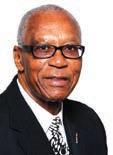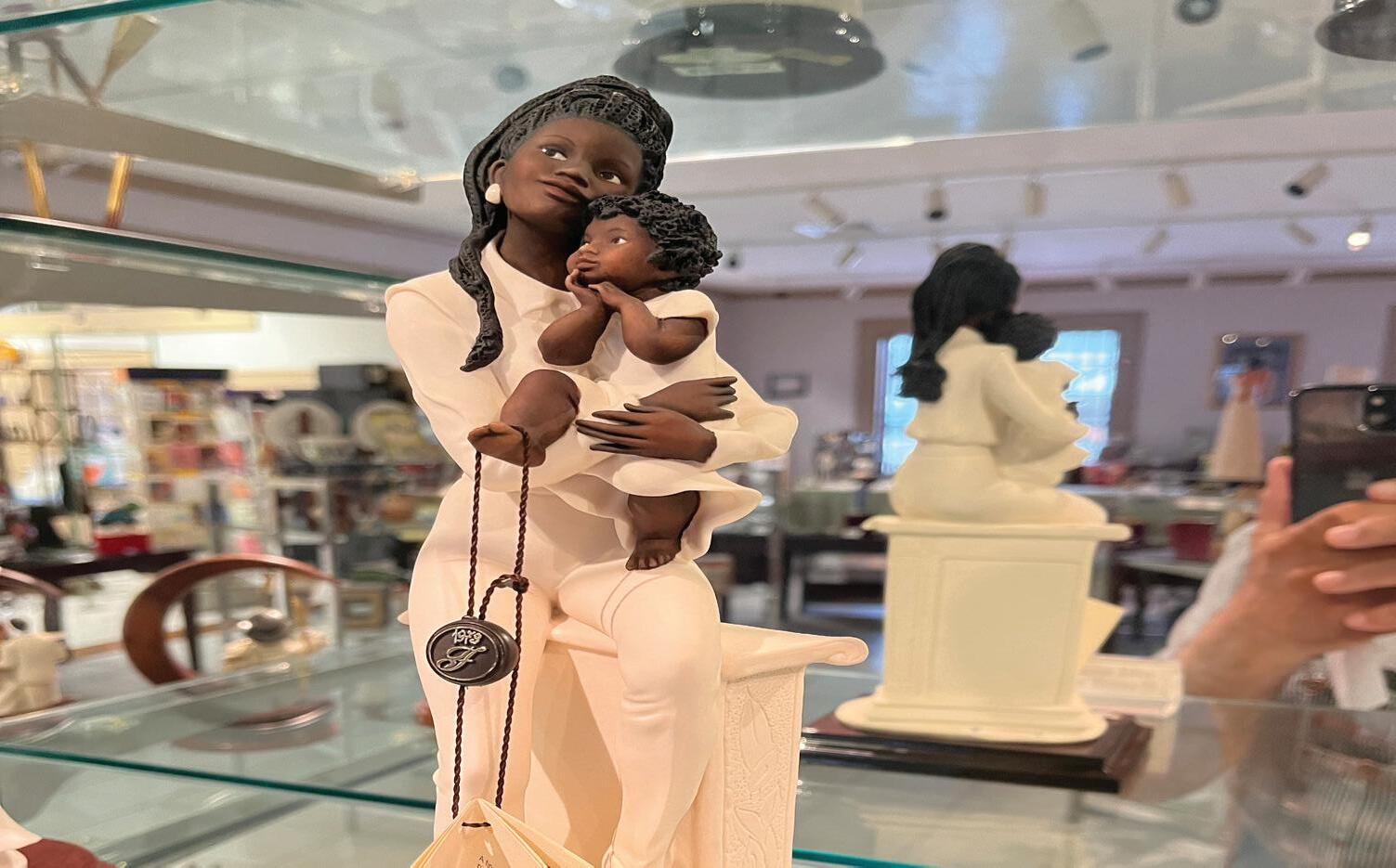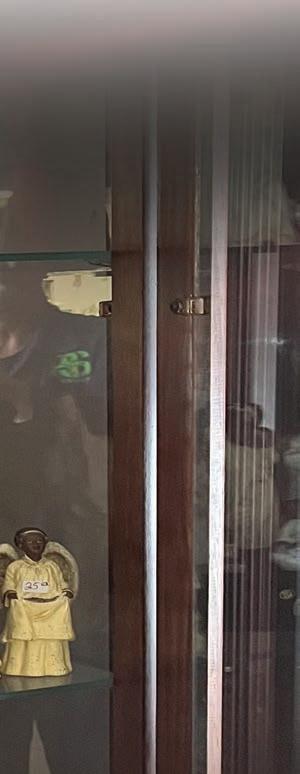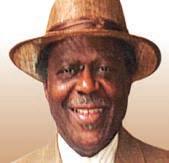EDITORIAL
A Revival of God Consciousness
Bobby Mills, Ph.D.
PASTORAL LEADERSHIP IN THE 21ST CENTURY
America, God is an ontological being that thinks logically. erefore, MAGA-Cult Followers, where were you when God laid the foundations of the universe? Every American knows this: “And as it is appointed unto men once to die, but a er this the judgment:” (Hebrews 9: 27a). Death is universally decreed and is not a respecter of socio-economic status. us, the devil is a demonic spirit that deals with illogical emotional thinking, and the objective of the devil is to motivate individuals to think with their emotions.
Sadly, America has become victimized to the nth degree by devilish, illogical, materialistic thinking. Job spiritually understood, and this is why God allowed the devil to test him, and a er enormous trials


and tribulations, he declared: “Naked came I out of my mother’s womb, and naked shall I return thither: the Lord gave, and the Lord hath taken away, blessed be the name of the Lord. In all this Job sinned not, nor charged God foolishly.” (Job 1: 21-22). us, this is precisely why the Bible declares: “For as he thinketh in his heart, so is he: Eat and drink, saith thee; but his heart is not with thee.” (Proverbs 23:7). e 2024 Presidential election is a classic example of emotionally irrational thinking, and America is now poised to reap the whirlwind of devilish confusion. However, America: “Be not deceived: God is not mocked: for whatsoever a man soweth, that shall he also reap. For he that soweth to his esh shall of the esh reap corruption: but he that soweth to the Spirit shall of the Spirit reap life everlasting.” (Galatians 6: 7-8). Hallelujah to the eternal King of Kings and want-to-be King Bashar alAssad, who is now in exile in Russia. Reading is developmentally enlightening,

By Roy Douglas Malonson,
WHAT IS WRONG WITH US
e Black slaves, a er receiving this indoctrination shall carry on and will become self refueling and self generating for hundreds of years maybe thousands. - Willie Lynch and e Making of a Slave. Do not be confused brothers and sisters, the plot to maintain our enslavement goes far beyond the release of our physical bodies, far beyond integration and the ghosts of Jim Crow. e plot remains evident as countless black bodies are slain by police and only rarely atoned for with convictions, and the rumor mills buzz of literal lynchings across the country. I have come to unearth this plot, and show you that the enemy has lulled us to sleep; by breaking the backs of Black leaders who now nd themselves too
weary to ght, a ght that should fall into the hands of the younger generation who have not noticed that the symbolic victories of 1964 have done more to isolate us than include us. All while the President Elect pushes the 44 year agenda of Project 2025 that not only eliminates the mandate to include us but erases our history from the history books. How could I ask you what is wrong with us when you likely do not know?
INTEGRATION
Without the help of Google, how many Black owned businesses can you name? Where is Black Wall Street in your community and how long has it been standing? Where do your Black dollars go, who polices you and teaches your children, who tends to your aching body when you are sick? Did you have trouble, or did you realize that the people in these vital roles are white? ere are some who will be in shock unable to fathom that the thought of the alternative to integration could be a better reality for our community. e truth is that
“We Africans in America have been socially engineered to reject our past, and far too many of us live in a state of suspended animation. We deny the historical realities confronting us daily. Too many of us mistakenly believe that the past has no bearing on the present and is unrelated to the future. Thus, we have been conditioned to live our lives disconnected from cultural values, principles, and ideals - essential for peaceful living.”
- Anthony T. Browder
1992, fol-
lowing a 34-year career. She opened the business in 1994.
“A er I retired, I said, ‘I’m going to have to do something,’” she said.
e shop’s legacy is deeply rooted in a history where Black people were o en excluded from property ownership and entrepreneurship.
Yet, Mrs. Malonson beat those odds, creating a space that not only provided a livelihood but also celebrated African American art and culture.
Starting in a small o ce, Mrs. Malonson has grown her business into a 6,500-squarefoot space on the property that she owns. Becoming an example of Black excellence, the choice of Acres Homes, a historically Black neighborhood in Houston, was deliberate. “No businesses were out here,” she said. “Now, I’m the only gi shop still standing.”
Owning property and running a successful business has always been important for
building wealth, but in the past, Black Americans faced many obstacles. ey dealt with unfair lending practices, areas where they weren’t allowed to live, and even violence to stop them from owning land. Despite these challenges, Mrs. Malonson worked hard, started her business, and has kept it going strong for 30 years.
Her commitment to providing an exceptional customer experience set Shirley Ann’s Kollectibles and Flowers apart. She greets every visitor personally, using “Mr.” and “Mrs.” as a sign of respect, a practice she adopted because Black people were o en denied that right in the past. “It takes training for customer experience, knowing who made something, where it comes from,” she said. “Being able to give customers recommendations is important to me.”
From the small details of expensive pieces to accessible trinkets like calendars and magnets, every item re ected
the richness of African American heritage. “ e more expensive pieces mean you are paying for the details,” she said. “Skin color, hair details, eyes. It’s all about the representation.”
Customers like Bettie Beasley, who has shopped at Shirley Ann’s Kollectables for 25 years, see the store as more than a place to buy items. “Black-owned businesses like this are important for heritage and culture,” Beasley said. Introduced to the store through a coworker, Beasley became a loyal customer, purchasing 10 to 12 calendars each year as gi s. During the pandemic, she developed a deeper connection with Mrs. Malonson, o en visiting the store for conversation and community. “It was my favorite place to be,” Beasley said. Running a business on this scale wasn’t without its challenges. “ e planning and thinking of it, I did not want it to go down quickly or fail,” Malonson said. Manufac-
turers would question Mrs. Malonson about her decision to focus exclusively on Black gurines, “ ey would ask me, ‘Why do you only want Black gurines?’” She said, “Because I want what represents me.”
Figurines have a long history, dating back centuries, but Black representation is a relatively recent development. For much of American history, gurines depicting Black people were either caricatures or racist stereotypes. Artists like Blackshear have changed the narrative, creating works that honor Black identity and experience. Customers have traveled from across the country to visit Shirley Ann’s Kollectibles and Flowers, and Mrs. Malonson has hosted signings with many of the artists whose work she carries. ese events have turned her shop into more than a retail space, but a place where Black art is celebrated and preserved. As she prepares to close
the shop, Mrs. Malonson is considering her next chapter, possibly “doing something at her family-owned ranch,” she said. For customers like Ms. Beasley, the closure is bittersweet. “I’m sad to see it go,” Beasley said.
ough the shop’s doors will close eventually, its legacy will be a testament to what Black people can achieve, even in the face of systemic obstacles.
Shirley Ann’s Kollectibles and Flowers is more than a gi shop. It is a celebration of history, culture, and the power of Black ownership and community.
Shirley Ann’s Kollectibles and Flowers is located at 6130 Wheatley St, Houston, TX, 77091, in the heart of the Acres Homes community. Visit before it closes its doors a er 30 years of serving the community.
ON RACIAL JUSTICE & CIVIL RIGHTS
Taken from justiceatthegate.com
THE DEMOCRATS’ PLATFORM
1944
We believe that racial and religious minorities have the right to live, develop, and vote equally with all citizens, and share the rights that are guaranteed by our Constitution. Congress should exert its full constitutional powers to protect these rights.
1948
e Democratic Party commits itself to continuing its e orts to eradicate all racial, religious, and economic discrimination. † We again state our
† While Franklin D. Roosevelt began a change in the way national Democrats treated African Americans, it was his successor, Harry S. Truman, who was even more courageous. He became the rst Democratic President to advocate for strong civil rights protections. Truman introduced an aggressive 10-point civil rights legislative package that included an anti-lynching law, a ban on the poll tax, and desegregation of the military, but congressional Democrats killed his proposals, including his proposed Civil Rights Commission.
Truman – like FDR before him – learned that it was di cult for rank-and- le Democrats to reshape their long-held views on race. e depth of this opposition was easily seen in signi cant elements of the Democratic Party. For example, when Ma Ferguson (Texas’ Democratic gubernatorial candidate) dared to criticize the Klan’s role in the southern Democratic Party, she was directly opposed in her Democratic primary with a Klan candidate, thus costing her the cohesive support of the Texas Democratic Party. In fact, a number of Klansmen ran on the various
THE REPUBLICANS’ PLATFORM
1944
We pledge an immediate congressional inquiry to ascertain the extent to which mistreatment, segregation, and discrimination against Negroes who are in our armed forces are impairing morale and e ciency, and the adoption of corrective legislation. e payment of any poll tax should not be a condition of voting in federal elections and we favor immediate submission of a constitutional amendment for its abolition. † We favor legislation against lynching and pledge our sincere e orts in behalf of its early enactment.
1948
Lynching or any other form of mob violence anywhere is a disgrace to any civilized state, and we favor the prompt enactment of legislation to end this infamy. †† One of the basic principles of † It was not until 1964 that the poll tax was nally abolished through the passage of the 24th Amendment to the Constitution. A repeal of the poll tax had been proposed on at least fourteen occasions prior to its nal approval, and on ve of those occasions the House had actually passed a ban; but each time Senate Democrats kept the poll tax alive. It was nearly eighty- ve years a er the poll tax to limit African American in uence was instituted by Democrats before the ban on the poll tax was nally approved by the U. S. Senate. Signi cantly, 91 percent of the Republicans in Congress voted to end the poll tax – a level of support much higher than that of Democrats; and of the 16 Senators who wanted to keep the poll tax alive in 1964, 15 of them were Democrats. e 24th Amendment banned poll taxes, but only for federal elections. Two years later, however, in 1966, the U. S. Supreme Court nally struck down poll taxes for all elections, including state and local. (See also the notes about poll taxes on pp. 9, 11, and 13.) †† See notes on pp. 15 and 18 regarding Republicans attempts to ban lynching.
be achieved, not wanting to spend any more time in the military. Alexis did 3 tours in Iraq. Alexis also became a drill sergeant, though he attributes the military to the orderliness he requires at home he also attributes it to the lessons provided by his mother. With his rst check from the military he brought his mother a car and has always felt the pressure of wanting to help his family. Alexis is a minister and is looking for space to start a church. He intends to pursue a bachelors in eology. Alexis began in the church at 12 and was baptized at 13, his desire to become a minister started when he heard a minister preach, copying the prayer that the pastor said every Sunday. Alexis is now the owner of Press the Button Garage Door Service in Houston, Texas. He was a foster parent from 2006-
2010 and opened two roller skating rinks and two soul food restaurants, a er reading Robert Kiyosakis’ “Rich Dad Poor Dad” a er leaving the oil and gas industry. When asked what advice he would give to those wanting to become Entrepreneurs, Alexis said “ it’s important to have a plan, put everything in writing and always have a little more money than you need to start to sustain.” Alexis also pointed out some of the challenges that he has faced as a Black man in business, mentioning that when property owners and surrounding businesses noticed that he was doing better than them complaints were made and he even saw rent hikes in the thousands. He also cited the from his own people as a major problem causing him to shut down some businesses. Alexis looks forward to the growth of his business and continues to take care of his mother and family.
19 of 26 Special Edition Alexis Cont.
NOTICE TO PROPOSERS Request for Proposal will be received by Lone Star College for:
• RFP #24-11-06 – Managed Services for ServiceNow. Electronic submittals due by 3:00PM, ursday, January 9, 2025.
• Contact: pamela.johnson@lonestar.edu or (832)813-6782.
• Must Register to Bid: https://lonestar.ionwave.net/Login.aspx. If registered, please ensure your registration is up to date. For assistance with the on-line registration process, contact MC-vendors@lonestar.edu.































































































































